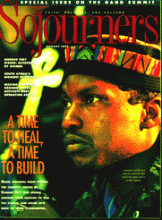Daniel "Nane" Alejandrez was the executive director of the National Coalition to End Barrio Warfare in Santa Cruz, California when this interview appeared. Created in 1992, the coalition worked on strategies to heal the Latino community and empower youth to become "Barrio Warriors" in the struggle for positive social change. Nane was co-chair of the Gang Summit, and he was interviewed there by Jim Wallis.
- The Editors
Jim Wallis: We just got out of the prayer circle. How are you feeling about the whole summit?
Nane Alejandrez: We've been up most of the night trying to get everything together. We're feeling tired, but the circle, the peace pipes, and the beautiful people here give you energy--energy that we need to go out and talk to young brothers and sisters about peace.
Wallis: This is really the first major coming together of Latino Americans and African Americans in a significant way. It's a historic event.
Alejandrez: That's how we see it. We've dealt with the same kind of violence as African Americans, so we have a lot in common. That's what made it come together. Our ghettos are hurting, and we need to create some change.
We need to develop new leadership because the traditional leadership has not reached us. It's significant to see brothers and sisters reaching out to people they don't even know, but who have the same pain--to see the respect they have for each other.
Wallis: Some people will be surprised at how spiritual this gathering was. Spiritual transformation and political transformation seemed to go hand in hand.
Alejandrez: The spirituality of this gathering had a lot to to with the presence of our great leader César Chávez, who also was respected in the African-American community. That brought us together.
Read the Full Article

